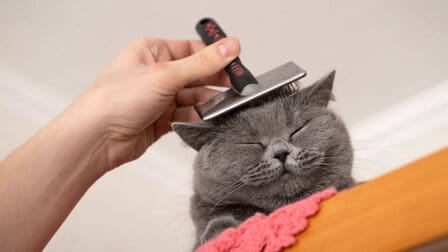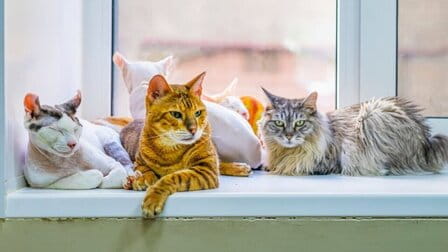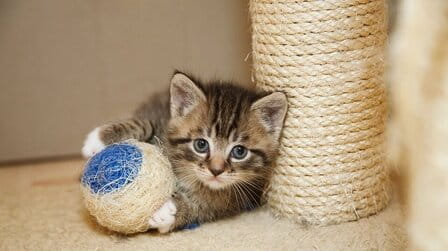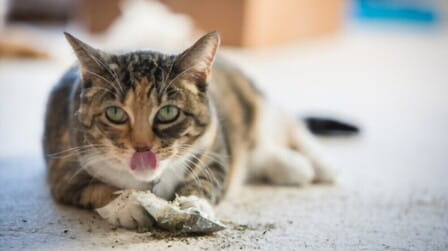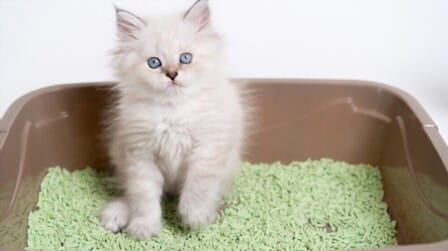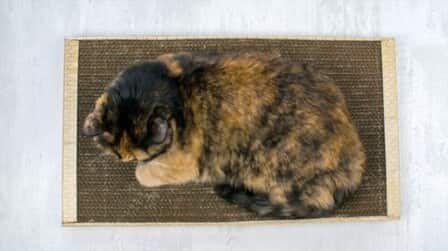It can be very upsetting for owners when their cats acquire a habit of peeing on the carpet. Cat urine has an unpleasant scent that frequently permeates the entire house. Additionally, cat urine is exceedingly difficult to get from carpet cushioning and fibers, which leaves odors behind.
Additionally, it can be challenging to solve the issue because cats have a propensity to keep urinating in places which already smell like urine. Cats may urinate from outside their litter boxes for a variety of reasons, such as urinary system and bladder difficulties, problems with the type of cat litter in use, and disputes with other animals. Learn further about how to prevent cats from peeing on carpet by reading on.
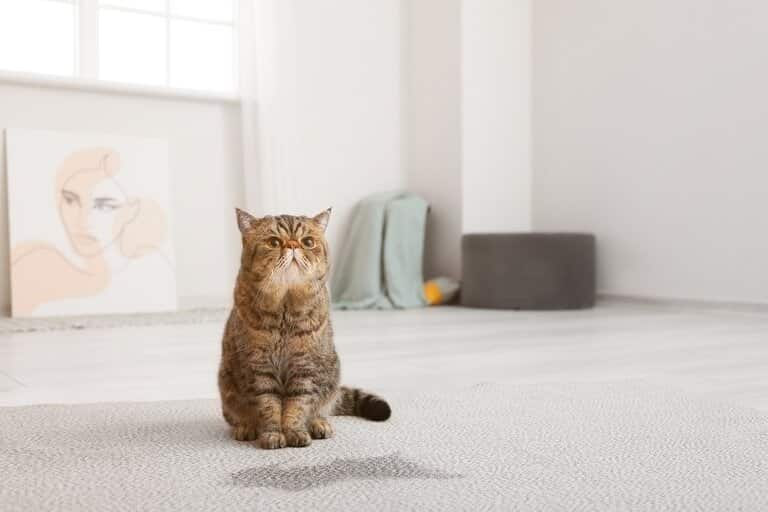
The reason why cat peeing on carpet
A cat may urinate beyond the litter box for a variety of reasons, such as health problems, anxiety, or bullying by other cats in the house that must be addressed. You ought to be able to figure out what has to be done to prevent your cat from urinating in unsuitable places with a little research (and perhaps a visit to the vet's office).
Underlying health issues
Your cat's health is always the first issue you check and the most crucial thing to consider if you notice any change in how your cat uses the restroom. Your cat may urinate more frequently than normal if it has one of several common medical conditions, such as diabetes, kidney illness, or bladder problems.
If the cat box becomes too dirty, they may urinate outside of it or may find it challenging to reach the tray in time to urinate. Always get them evaluated by a vet right away if you notice a shift in their potty habits, especially when your cat also isn't urinating at all.

New cat in your home
Your current cat might be anxious or unsure about how the recent introduction of a new cat will affect their daily routine if their urination patterns have changed. They can be spraying pee outside their litter box as a form of territorial marking. Fortunately, there are many strategies for fostering pleasant cat connections and assisting them in making the most effective introductions.

Indicating a boundary
When a cat reaches adulthood, it often begins marking its territory by "spraying," which is frequently mistaken for urination. A cat uses this method of marking its territory to communicate to other cats or animals that this place is a part of their territory and that "they are here." Other markers of a cat's presence include smell marks left on paw and visible scratch marks. Alternatively, they can be using messaging to let cats of the opposite sex know that they are "available."
Alternatively, they can be spraying because they're anxious and the urine stains make the places feel safer and more regular.
How to prevent cats from peeing on carpet
Cats aren't doing anything wrong when they "go" outside the box, despite the fact that finding cat urine around the house is naturally distressing. They are merely acting in a manner that meets their current demands.
Here are some strategies for getting your cat to stop using the litter box as a bathroom.

Check a veterinarian
The most important part you can do if the cat has began going further than cat box is to make an appointment to the veterinarian.
Cats may urinate beyond the litter box for a variety of reasons, including urinary tract infections, hyperthyroidism, cat unexplained cystitis, bladder crystals and stone, rheumatism, diabetes, and renal illness.
The veterinarian will ask about the issue and how it started. They will then conduct a physical examination, urine, and possibly other diagnoses to determine whether the problem is medically or behavioral.
If your cat is granted the all-clear, your vet can assist you in addressing any potential environmental or behavioral problems.
Eliminate the mess extensively
Regardless of whether your veterinarian believes that the issue is behavioral or medical, make sure to completely clean any locations where the cat has urinated outside of the litter box. You should ensure that the aroma has been entirely eradicated for your own advantage as well as to avoid your cat from revisiting the same particular location to the smell.
Everything you require is a black flashlight and your smell sensation to find every problem site.
Dabbing all of the fresh urine as possible with paper and cotton towels.. Next, choose the most effective cleaning technique based on the type of contamination (and for older stains).
- You might wash bedding, clothes, towels, and other items in the washer on the cold cycle, then hang them to dry outside.
- Hard surfaces such as floors and other: Use a pet stain and odor remover or a normal household cleaning solution to give the area a thorough cleaning.
- Rugs, carpets, beds, and upholstery should all be cleaned using an enzyme or bacterial cleaner, such as Nature's Miracle Only For Cats Oxygen Cat Spot and Odor Removal. However, to ensure maximum efficacy, always follow the product's directions.
Deal with territorial issues

Cats might frequently spray to designate their territory. Cats typically crouch close to a vertical wall and shoot a small quantity of urine onto it when they spray. As a result, if you discover a splat of urine just on walls, your cat is likely spraying rather than peeing.
The cats who spray most often are complete males. Prior to puberty, which occurs in cats at five or six months of age, neutering is preferable. Any veterinarian can help you decide when is the best moment to spay or neuter the kitten.
Make your neutered cat feel more at ease in his domain if he is spraying. In a household with numerous cats, it may be good to offer every cat its own living space. If this isn't possible, consider getting several tall cat branches or perches and setting up covered escape routes and hiding spots so cats may easily avoid one another.
The possessive problem is often caused by neighborhood or stray cats outside your home. Even catching a peek of your interior cat via the doors could prove problematic. Spraying cats may also benefit from over-the-counter anxiety-relieving medications such Vetoquinol Zylkene soothing supplement and Feliway Classic. If anything else fails, your veterinarian may advise you to take serotonin or another anti-anxiety medication.
Limit fights among your cats

Excessive urination might result from fights between cats or from introducing a new cat.
Your cats may decide to avoid the litter box rather than face the danger that yet another battle will break out if they use it if they recently got into a fight in or near the box. For a period, keep your cats apart to allow any tensions subside, and then try slowly reintroducing them.
A single cat may be guarding the litter box. Ensure that there are many litter boxes spread around your house to ensure that no single cat can deny entry to each and every box at the same time. You may also consider utilizing a fully accessible litter box to guarantee that the cat is always alert to their surroundings.
Give out more boxes

It's time to examine your litter box closely if you've found whether your cat is peeing improperly rather than spraying. What number do you have first? Frequently, one cat box is insufficient. A box for each cat, plus one more, is the normal rule of thumb.
Cats can be very choosy when it comes to utilizing a box that contains urine or excrement in it, especially if it is not their own. When you have a variety of litter boxes accessible, your cat is much more likely to discover one that works with them.
Conclusion
Overall, our article could help you to know how to prevent cats from peeing on carpet if you're one of the numerous pet parents who has had the uncomfortable feeling of making your way groggily to the fridge for your coffee in the morning only to walk in a fresh, and also very sweaty, patch of urine all along way.

